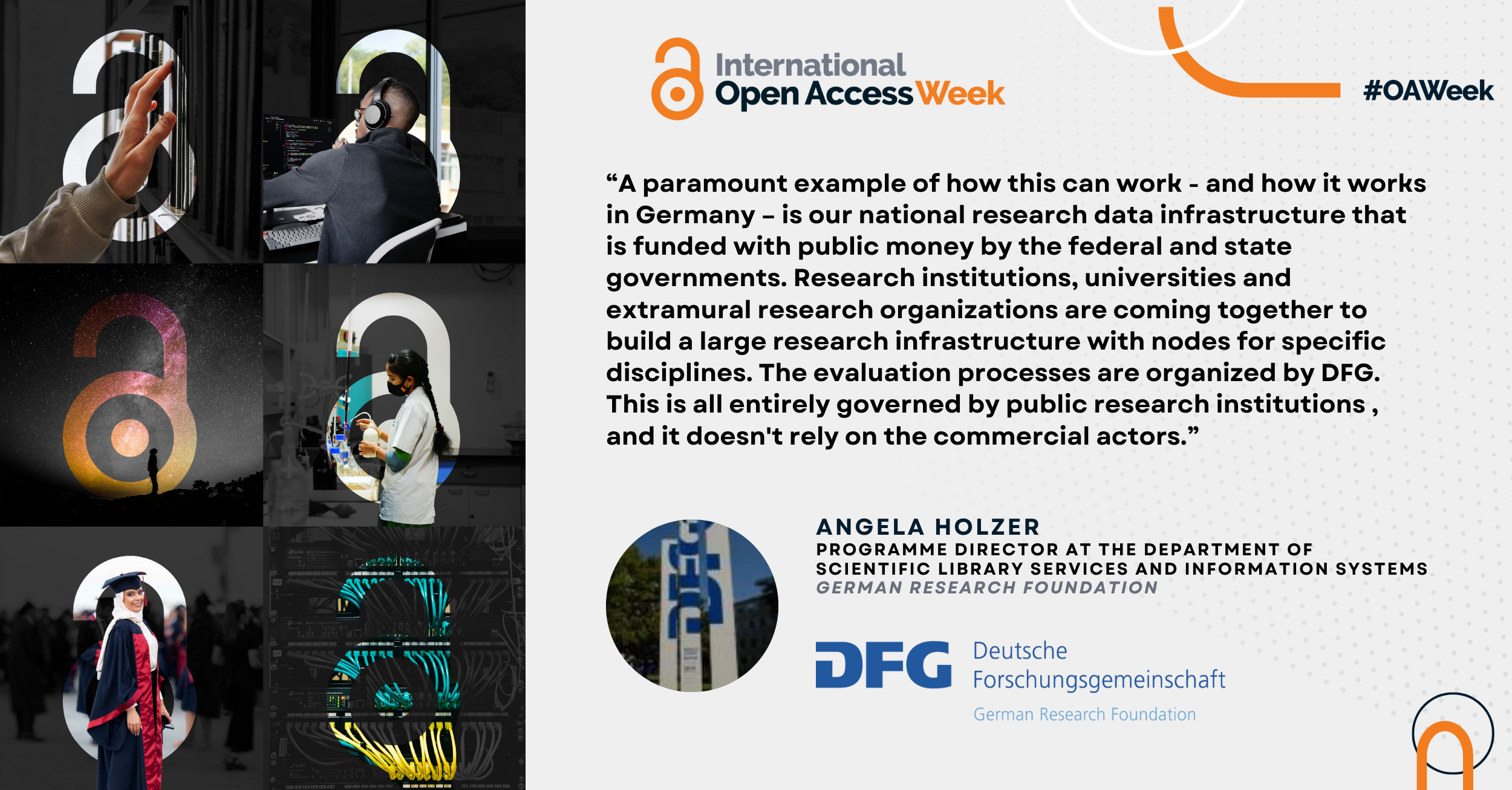German Research Foundation (DFG)
Background: German Research Foundation (DFG) began in the 1920s as the Notgemeinschaft der Deutschen Wissenschaft to help revive scientific research and infrastructure after World War I. Today, it is the largest research funder in all disciplines in Germany supported jointly by the federal and state governments. It is a self-governing organization of research whose members include universities, other research institutions, academies of sciences and humanities, and scientific associations in Germany.
Mission: DFG’s mission is to fund excellent research and be the voice of research communities. It is involved in advocating for science policy, keeping research integrity at the forefront. DFG builds on freedom of research and advancing sovereignty in the entire research environment. It works to ensure the effectiveness and appeal of Germany as a center for research, promoting its adaptability, flexibility, inclusiveness and diversity.
Who Owns Our Knowledge?
“This is an important topic that we are discussing internally. We often frame it in the terms of autonomy and sovereignty of science and research. How can we best create guardrails for research institutions to be autonomous and to act sovereignly - to own knowledge production processes and to own research results and infrastructures in which they are handled?”
“A paramount example of how this can work - and how it works in Germany – is our national research data infrastructure that is funded with public money by the federal and state governments. Research institutions, universities and extramural research organizations are coming together to build a large research infrastructure with nodes for specific disciplines. The evaluation processes are organized by DFG. This is all entirely governed by public research institutions , and it doesn't rely on the commercial actors.”
“It’s a difficult topic of who owns and who uses the data that is produced by using digital objects, so-called tracking data. We don't own this type of data. The data goes to the large corporations that offer major publication databases, and we don't know what they do with it. They are able to combine a lot of tracking data - who uses which publications, what kind of things are being read by whom, and who researchers on which topics. ”
“We certainly know who should own the publications! The creator in the sense that he or she can basically decide how it is going to be used. The creator should be the owner in terms of giving licenses to reuse. It’s not a publisher. It’s the individual who produces something. It’s for the public good, for other researchers, for society. It’s not to be monetized by companies and hidden away from the public.”
“Every project is funded by public money so the public has a moral right to see the results.”
“If I create something and I give it away to an infrastructure – a publishing platform – I should know who makes the decisions about what happens to my metadata, to my content, to the tracking data. Can I trust the actor? If it’s a research institution, there is often more trust. Basically, it's also about trust and about knowledge and transparency regarding what happens to the results that scientific actors produce.”
-Angela Holzer, Programme Director at the Department of Scientific Library Services and Information Systems at the German Research Foundation (DFG)
“The question is not just who owns the knowledge, but also who controls the data and the environment? Who owns the infrastructure? You have to look at it in the broader context of the entire information system. The German Research Foundation and other organizations world-wide are trying to support the change in research culture and research assessment. It takes a long time - especially with commercial actors in the background rapidly advancing their technology, it’s hard to keep up.”
“For “knowledge” in publications, we can't really say science owns it. It's not true, unfortunately. There are science-led Diamond Open Access publishing activities that are growing, but the majority is still in publishers’ hands. It's hard to make this shift. There is an asymmetry in the system and it’s a power asymmetry.”
“With Diamond Open Access, articles are published free of charge for authors and readers under an open access-compliant license – thus, the “knowledge” belongs to the scientific community. We are trying to increase the efficiency of the Diamond Open Access publishing in Germany with its growing number of DOA journals and DOA infrastructures by funding a national Service Centre for Diamond Open Access (SeDOA) coordinating these activities and offering services and advice.”
-Michaela Bilic-Merdes, Programme Director at the Department of Scientific Library Services and Information Systems at the German Research Foundation (DFG)

